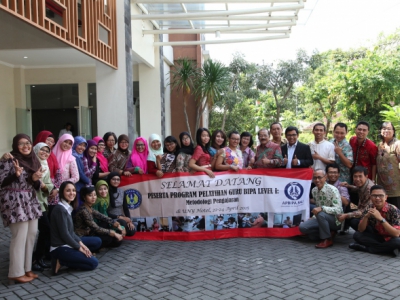Office of International Affairs and Partnership Hold a Level 1 Training Program for BIPA Teachers: Teaching Methodology

BIPA program (Indonesian Language and Culture Course for Foreigners) has been considered as a pivotal aspect of Indonesian Language development in global perspective. Therefore, Office of International Affairs and Partnership (OIAP) of YSU held a Level I Training Program for BIPA Teachers: Teaching Methodology from Wednesday to Friday (22-24/04/2015) in YSU Hotel.
The training invited three speakers, namely Nyoman Riasa, Widodo H.S., and M. Bundhowi from BIPA Teacher Association (APBIPA) of Bali. The three are experts, instructors and planners for various program courses and management of BIPA.
The training was participated by numerous participants from various higher educations, language institutions and international schools in Yogyakarta, East Java and East Kalimantan. During the three days of the training, they learned and practiced a number of activities in BIPA Teaching Methodology.
Dr.-Ing. Satoto E. Nayono, M.Eng., M.Sc., Director of Office of International Affairs and Partnership, said that the training was one of YSU’s efforts to develop BIPA teacher competence. “Indonesian Language plays an important in the ASEAN Economic Community (AEC). This training will prepare qualified BIPA teachers as the demand of their service is continuously increasign,” he said.
The first instructor, Widodo HS., explained that the development of BIPA is needed due to the absence of its research in the colonial era. “BIPA was born when foreigners were eager to learn Indonesian Language. Therefore, we need to develop as well as preserve our language,” he said.
Meanwhile, the second instructor, Nyoman Riasa said that BIPA program has been scientifically and economically diversified. “BIPA teachers should possess methodology competence. It is not sufficient to only be Indonesian native speakers, teachers should have methodological competence to teach BIPA,” he emphasized.
The third speaker, M. Bundhowi, provided a unique approach to teach BIPA. He invited all participants to deepen their cross-cultural understanding as well as to boost their creativity in processing and developing BIPA teaching media.
“This training gives me a lot of chances to learn and practice various BIPA teaching materials. I am waiting to meet various inspiring BIPA teachers in the next forum,” said Sheila Gumiwang Cascales, a participant from Lembaga Indonesia Spanyol (Spannish Institute Indonesia, Yogyakarta).
Due to the fact that BIPA is a new phenomenon, the training is considered as a strategic breakthrough to respond BIPA teacher demand. This training is hoped to develop BIPA as well as to attract more people to take role in BIPA development. (Yuliana)

